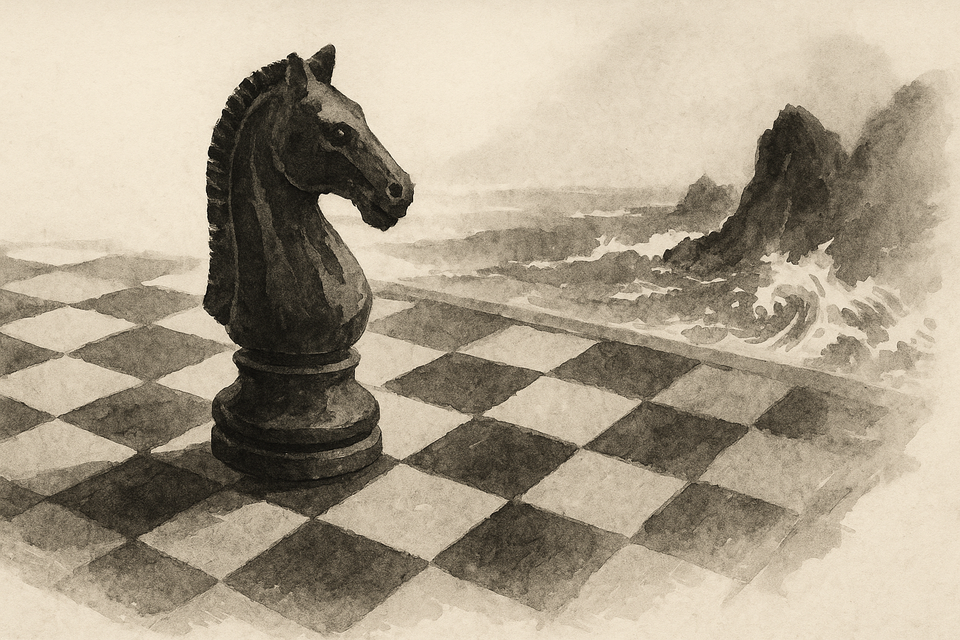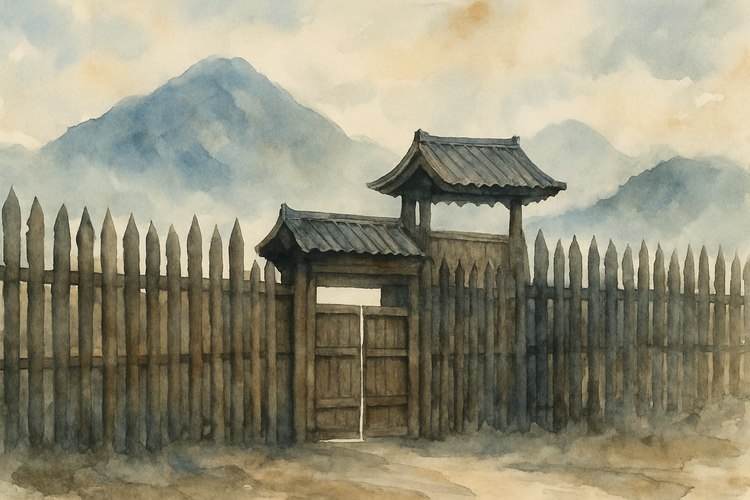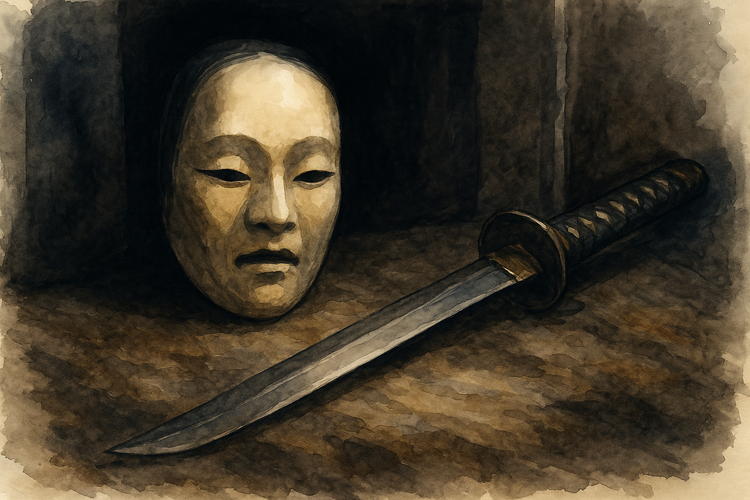Shōgun S1E2 "Servants of Two Masters"

Extensive spoilers follow for Episode 2.
Opening Flashback
The episode opens not in the present but a year earlier, at the deathbed of the Taiko. His offer to Toranaga of sole regency is less a gift than a gambit, one final test of foresight. Toranaga declines, explaining that such a concentration of power would collapse under suspicion and opposition. What looks like refusal is itself a move: the Taiko has anticipated this response, and by design leaves behind a council of regents locked in perpetual stalemate. It is the opening arrangement of the chessboard, when pieces are set and rules enforced. From the first scene, the story frames Toranaga not as a reckless power-seeker but as a strategist already calculating the cost of every position he might occupy.
The Ledger & First Meetings
In the present, the game turns to information. The Catholic fathers guard Blackthorne’s journals, keeping their contents hidden from Japanese hands. It’s not the ledger itself that matters so much as what the act represents: control of knowledge, the hoarding of advantage. That motif — knowledge as the most dangerous currency — will resurface when Toranaga demands a map of the world.
That atmosphere of guarded truths carries into the chamber where Toranaga, Blackthorne, Mariko, and Father Martin Alvito meet. Four figures, each playing a role in a conversation that is really a test of control. Toranaga speaks sparingly but with intent, gauging how much value this foreigner might hold. Blackthorne, still stumbling against both language and ignorance, barely grasps the weight of what unfolds around him.
Between them stand the interpreters, and here the contest sharpens. Alvito’s role is never neutral: his translations lean toward the Church’s interests, softening or shading meaning to preserve Catholic influence. But Toranaga has anticipated this. By placing Mariko in the room, he ensures he has his own loyal voice — a silent but unmistakable threat to Alvito. Every word Blackthorne utters passes through two filters, and Alvito knows that if he bends the truth too far, Mariko will expose him. Her presence forces the Jesuit into check, securing Toranaga’s position on the board.
What emerges is less a diplomatic exchange than the first clash of strategies: Toranaga refusing to cede control of the narrative, Alvito hemmed in, Mariko proving her indispensability, and Blackthorne realizing he is the least powerful figure in a conversation ostensibly about him. Yet even this small exchange stirs unease among Toranaga’s rivals. Blackthorne’s presence is disruptive, his knowledge dangerous in the wrong hands. To keep suspicion from hardening into attack, Toranaga makes his next move.
Imprisonment & Prison Dialogues
He sends Blackthorne to prison — a move that looks like concession but is really strategy. The confinement is a feint, easing pressure without discarding a piece he intends to use later. Blackthorne is hidden, not lost.
Inside the crude wooden cell, he encounters Father Domingo, a Franciscan prisoner. Shackled by the same forces that threaten to undo Blackthorne, Domingo speaks with the bluntness of someone who has nothing left to lose. He sketches fragments of the larger board: Toranaga’s history, rivalries among the regents, and the corrosive role of the Church in Japan’s upheavals.
The exchange is quietly devastating. For Blackthorne, once a pilot responsible for guiding ships across oceans, it is the moment he begins to grasp how little he can steer here. In Domingo’s account he sees how the Jesuits manipulated Japan’s trade and politics, fomenting rebellion in the process. The realization cuts deeper than the wooden walls around him: where once he guided others by the stars, now he finds himself adrift, a piece to be moved by powers he cannot control. The implications ripple outward. Even as Blackthorne sits confined, the council outside seethes with unease.
Council and Demands
Domingo’s revelations leave Blackthorne reeling, but beyond the prison walls the stakes sharpen further. His existence alone unsettles the balance; to the Christian regents, he is too dangerous to live. At the council, voices rise in anger, demanding the foreign pilot’s execution before any vote can be taken on Toranaga’s future.
The demand is less about Blackthorne himself than about what he represents. His presence threatens to fracture the Church’s control of trade and to complicate fragile alliances among the regents. By insisting on his death, the Christian lords seek to eliminate a piece that could open new lines of play for Toranaga.
Here the chess motif comes into stark relief: Toranaga has maneuvered to keep Blackthorne in reserve, hidden but still usable. The regents’ call for execution is a direct attempt to take that piece off the board. What Blackthorne sees as bewildering hostility is, in truth, the mark of his growing value. Even unseen, even silent, he has become an object of contention powerful enough to shape the game.
Yabushige’s Move & the World Map Reveal
The council’s fury sets the board quivering, but Toranaga is not its only strategist. When Lord Kiyama’s men remove Blackthorne from prison, it seems the Christians’ demand will soon be satisfied. Yet on the road, Lord Yabushige makes his own play. Staging a false bandit attack, he “rescues” the foreigner and claims him, turning a death sentence into a tool of his own ambition. It is not loyalty but calculation: by holding Blackthorne, Yabushige gains a bargaining chip he can offer to whichever side proves strongest. Opportunism is his strategy, and in this moment he shows how fragile Toranaga’s control can be when others seize pieces for themselves.
Soon Blackthorne is back in Toranaga’s orbit, and his value is tested in a different way. Toranaga commands him to draw a map of the world. What spreads across the paper is a revelation that shakes every assumption in the room. Japan, once imagined as the center of existence, appears as a scattering of islands at the edge of vast oceans. In that moment, the ledger’s hidden pages find their echo: where the priests concealed knowledge to maintain influence, Blackthorne’s map unveils it, disrupting old certainties with the scale of the unknown.
When Blackthorne is told he has no chance — that the Portuguese are too numerous, their power too entrenched — he answers with a flash of pride: “Unless I win.” It is arrogance, but not empty arrogance: the refusal of a pilot who has steered through impossible odds before. And the line does not reach Toranaga raw — it comes through Mariko’s voice, clear and steady, the loyal translation he has come to trust. In her phrasing, the defiance is sharpened rather than softened. Toranaga allows himself the faintest smile, recognizing in this foreigner a reflection of his own ambition and fearlessness. Blackthorne may be reckless, but in that recklessness lies a courage Toranaga can respect — and perhaps use.
The Assassin
That faint smile lingers as Toranaga absorbs what he has seen and heard — Blackthorne’s arrogance, his bravery, his value. But the game does not allow pieces to remain unchallenged for long. That very night, violence intrudes.
A shinobi, disguised as a maid, slips into the quarters meant for Blackthorne. Only Toranaga’s precaution — switching sleeping arrangements with the pilot — reveals the true target. When the assassin strikes, it is Toranaga who meets her blade and kills her himself. The inversion is striking: Blackthorne’s presence draws death toward Toranaga, as though the danger attached to the foreigner spills onto anyone near him.
The conclusion is unmistakable. The attempt was not meant for Toranaga but for Blackthorne. His survival is no longer about his usefulness in council intrigue or on maps of the wider world. His existence has become threatening enough to warrant a covert killing. For Toranaga, the attack confirms what he already sensed in the defiant words “Unless I win.” This foreigner is more than a pawn — he is a piece others are desperate to remove, which only sharpens his value to the one strategist determined to keep him in play.
Conclusion: Pieces in Motion
Across its span, “Servants of Two Masters” lays out the board with deliberate precision. From the Taiko’s deathbed stalemate to the regents’ fury, from Mariko’s silent check on Alvito to Domingo’s blunt warnings in prison, every scene reaffirms that power in Japan is not won by strength alone but by foresight, by the ability to anticipate the move beyond the one at hand.
Blackthorne’s arrival destabilizes this balance. Once merely a pilot adrift in an alien land, he emerges here as a contested piece, claimed and reclaimed, hidden and revealed, alternately pawn and knight depending on who wields him. His arrogance — “Unless I win” — marks him as reckless, but also as someone Toranaga recognizes as useful. That faint smile is the acknowledgement of a mirror: two men who understand that victory lies not in safety but in risk.
The assassination attempt drives the point home. Blackthorne is no longer background to the regents’ game; he is a target, a threat worth killing. And so the episode closes with the board alive with tension — Toranaga cautious but calculating, Yabushige opportunistic, the Church guarding its secrets, and Blackthorne, once ignorant of the game, now marked as a player within it. Every move is perilous, but the direction is unmistakable: the game has only just begun.



Comments ()